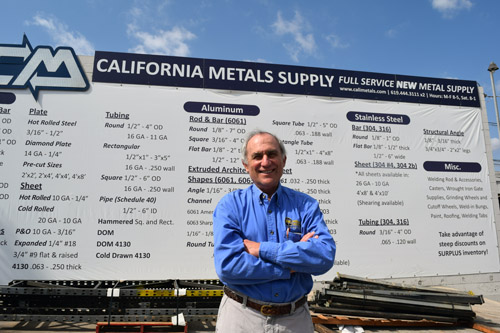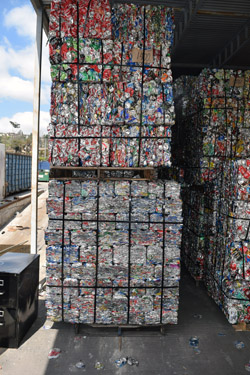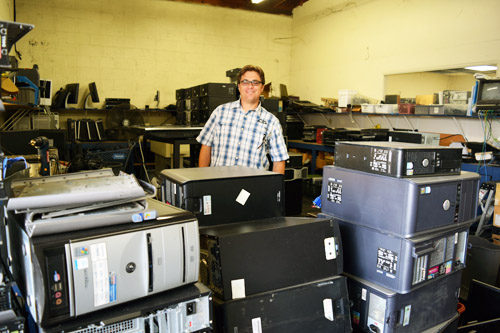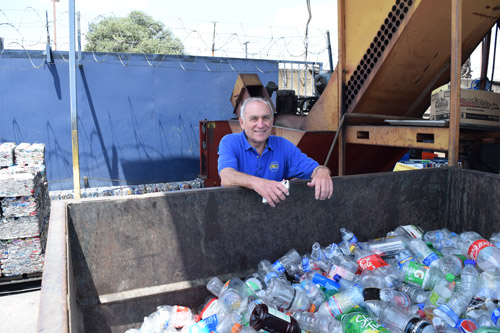
-47th in a Series –
Exit 16, Main Street, El Cajon — California Metals
By Donald H. Harrison


EL CAJON, California – Like peddling, the “junk business” was especially attractive to entrepreneurs because they didn’t need a lot of capital to get started. Many Jews, among other groups of immigrants, began their business careers this way.
Jerry Turchin is CEO of California Metals at 297 S. Marshall Avenue and of California Metals Supply next door. He relates the story of his own father-in-law, Mel Klein, who immediately following World War II “used to peddle produce in New York from his pickup truck. He had a problem when he couldn’t sell everything because if produce is no longer fresh it is no longer saleable. That is why he got into the scrap metal business. Scrap metal doesn’t spoil.”
“Mel was very good at what he did,” Turchin continued. “He had one employee and himself on a truck. He would get out on the truck at 6:30 in the morning and by 11:30 a.m. they were done with the pick ups. It was a very simple business. They’d buy the scrap in the morning, and sell it in the afternoon. He immediately knew what his profit was.”
Turchin trained for a different kind of career. He earned a Bachelor’s degree in hotels and restaurant management from Florida State University, then went on to earn a Master’s of Business Administration from New York University. He went to work as a systems analyst for the Two Guys Department Store chain. He asked for a transfer to the merchandising department, and was refused, because his father owned three appliance stores, and Two Guys management considered the father a competitor. So, Turchin went to work for Bloomingdales, but didn’t love the commuting. That’s when his father-in-law asked him to come into his scrap metal business at the same salary he was earning, but without the commute.
So he learned the business, at one time establishing an independent route, and for a while operating both his own business and his father-in-law’s after Klein moved from New Jersey to San Diego. Eventually, Turchin decided to sell both Klein’s and his businesses and moved out to San Diego County to become a partner with Klein, who had opened another scrap metal business on rented property in El Cajon in 1978.
Turchin decided that the business needed room to grow, and making a leap of faith, rented in 1982 the much larger property at the current address. The decision quintupled the rent to $3000 per month, much to his father-in-law’s consternation. Eventually, Turchin was able to persuade the owners to sell the 38,000 square foot property to him. Turchin also owns Miller Metals nearby, which has 50,000 square feet and handles scrap steel in much greater sizes and quantities.
What used to be called the “junk business” evolved into the “scrap metal business” and today, in an environmentally conscious world, is called the “recycling business.”
Turchin’s son, Josh, grew up at the scrap metal yard, and when it was time for college, he majored in philosophy at Washington University in St. Louis. He actually had intended to go on to medical school, but “growing up in an entrepreneurial environment like this, I couldn’t see paying for 12 years of school,” Josh said. “My orientation is to get out and make money. It turned out that I became kind of an expert in electronic recycling. I spoke at national conventions of scrap dealers. I was sent around to speak to the old guard about what it takes to be in this business. It is something the world needs; I had to do this.”
Josh, who today is the president of California Metals, escorted me on a tour of the facility, and in the process taught me some of the scrap metal industry’s jargon.
“Two functional wings of the business are ‘door trade’ and ‘reverse retail,’ he said. “’Door trade is what we pick up from shops, from machinists who produce scrap metal as part of their regular business function. We do bin exchanges with them. We bring out bins for them to put their scrap metal in and then we pick them up and exchange them for empty bins.” California Metal pays these customers for their metal, aggregates the haul with other collections, then sells metal by the ton to foundries to be melted down and recast.
Josh added that “we also do door trade with electronic scrap-generating customers, such as offices and commercial users. We guarantee data destruction and keep the electronic equipment (including computers) from the waste stream.”

Old computers turned in to California Metals are disassembled. To protect the privacy of the former users’ data, said Josh, “we remove anything that is a circuit board from any kind of electronic equipment.” Further, “we have software that meets Department of Defense requirements for data erasure. It writes over all the sectors with 0’s and 1’s five times, making your data irretrievable. We also have a drill press. Some customers like the pageantry of us putting a hole through their drives. But in any case the logic board is separated from the hard drive—which essentially is aluminum platters and housing. You need that specific logic board to make that hard drive work, and they are sent to different countries. The aluminum gets melted as aluminum scrap.”
Other components such as monitors can be resold, but “less and less of the electronic scrap that we get is reusable,” said Josh.
In addition to those items that California Metals picks up at other businesses, there are additional items that come to the company in what it calls its “reverse retail” business. “That is when people bring things to us, for example bottles and cans, electronic scrap, and commercial scrap metal.” Odds and ends come in from people who are cleaning out their garages, spare rooms, basements, or attics.
Josh has created a separate business called One Earth which pays for recyclables at facilities located near two Home Depot outlets, one in Mission Valley (at 5980 Fairmount Avenue), and the other just east of Imperial Beach at 685-B Saturn Boulevard. People also bring their cans and bottles to California Metals.

The One Earth locations near Home Depots are “little storefront operations, like walking into Starbucks,” Josh said. He explained that it is not enough to preach sustainability, it is important to make recycling easy for consumers. He said he would like to see people routinely bringing in their cans, bottles and other recyclables every time they go shopping, using the money they receive for the recyclables to partly finance their next purchases.
To enable that, he said, recycling centers need to be attractive and convenient.
Anheuser-Busch, a large customer of California Metals, says it takes only six weeks from the time a crushed can leaves California Metals for it to be back on a grocery store shelf filled with product.
The Turchins’ business next door, California Metals Supply, purchases sheet metal from wholesalers to be sold to such customers as machine shops. The idea, explained Jerry Turchin (the father) is to be on both sides of the business: picking up the scrap from machine shops and selling them more metal with which to make their products and to generate more scrap.
Jerry Turchin remembers when he and his late father-in-law Mel Klein had philosophical disagreement over the way the business should expand. Klein was aghast when Jerry first proposed expanding the business. He agonized over the increase in rent from $600 to $3,000 a month, whereas Jerry saw the possibility of having room for larger metal tonnage, which could be sold at far higher prices and margins.
Now Josh, representing the third generation, has his philosophical differences with his father. By combining recycling with other company’s retail operations, he sees an opportunity to spread the message of environmentalism, all the while generating source material for the scrap metal business.
Jerry, on the other hand, quotes his own father, who owned the three appliance stores. “When you work with dollars, you make pennies,” he said. “When you work with hundreds, you make dollars.” According to that philosophy, establishing little storefront operations to collect recyclable materials only makes pennies. Far better, in Jerry’s viewpoint, to deal in products worth hundreds or even thousands of dollars.”
Which generation of the family is right? The younger Turchin believes success can be measured by “1) benefits to the environment; 2) tons of materials removed from the local waste stream; 3) energy spared as a result of recycling resources instead of mining virgin resources; 4) the amount of money returned to local businesses through recycling, and 5) of course, the spread we make, we want to make a profit on every item that we touch.”
While Jerry isn’t dead-set against his son’s idealistic campaign, he views it with a measure of skepticism.
He said he doesn’t believe many people will recycle because they want to save the earth. However, he said, “I believe the best reason to recycle is to make money to pay bills. When legislation passed in 1987, with a nickel redemption value on cans, that gave people the incentive to recycle.” The greater the incentive, he suggested, the more people will be motivated.
As a longtime El Cajon businessman, Jerry Turchin has been active on the East County Chamber of Commerce. He served on the membership and government affairs committees, and now is a member of the chamber’s overall board of directors. In February 2015, he was appointed by the City Council to the El Cajon Planning Commission.
“I have been in business here since 1978, lived in El Cajon since 1983, I’ve put kids through college, so I feel that this community has been very good to me, and I volunteered,” he said. “Why not?”
*
From Main Street exit (east bound) turn right at the bottom of the off-ramp, then right onto Marshall Ave. California Metals is about 6 doors in on the left side of the street, across from the transit center parking lot.
Next: Chains of Success
*
Harrison is editor of San Diego Jewish World. You may contact him at donald.harrison@sdjewishworld.com